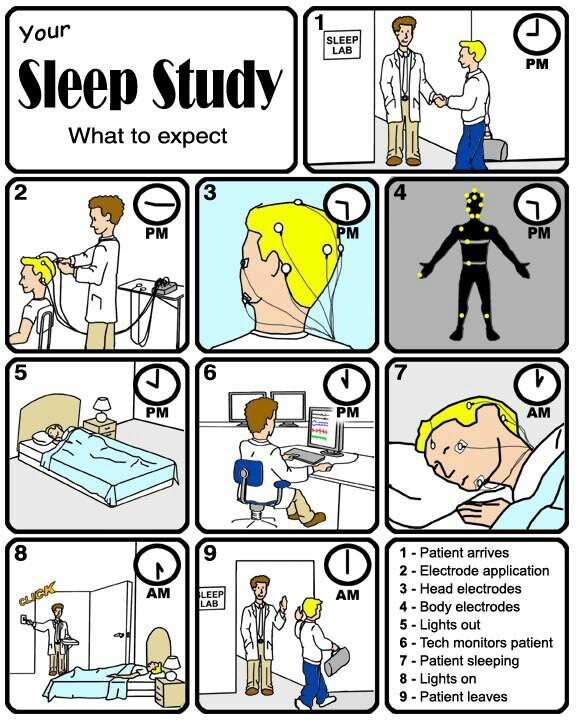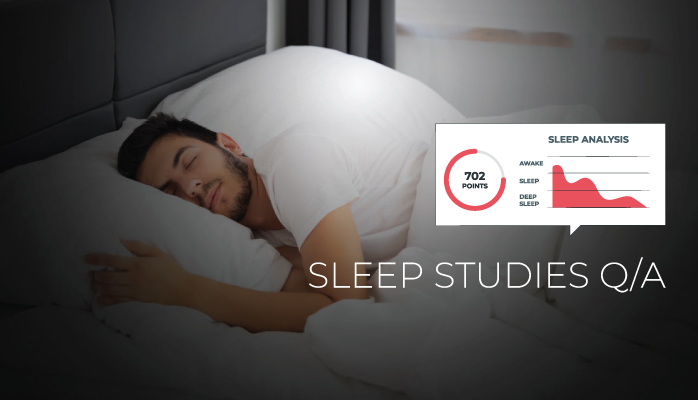What do Sleep Studies Monitor?
Sleep studies are important diagnostic tools for common sleep disorders like sleep apnea, insomnia, circadian and rhythm disorders. Sleep studies have proven to be particularly important in Alaska where the extreme darkness and lightness tend to either cause or worsen sleep disorders.
Sleep studies are non-invasive - no poking or prodding or waking you up throughout the night. It's just like normal sleep except you sleep at the sleep center connected to some monitoring equipment. They monitor:
- Brainwave activity
- Eye movement
- Muscle movement
- Heart activity
- Breathing
- Blood oxygen level
The results from the sleep study will help either provide a diagnoses or clarify what (if anything) may be causing concern related to your sleeping habits.
What is the Process of a Sleep Study?

The following outlines the basic process of a sleep study:
- You arrive at the facility in the late evening
- You get ready for sleep and lie down in a private room
- Sleep specialists hook you up to monitoring devices, adjusting them as needed
- Sleep specialists monitor while you sleep
- In the morning when you wake up you can shower and have a light, complimentary breakfast at our facility
Most of what happens is done with computers that automatically monitor your sleep data.
What are Common Reasons People Get a Sleep Study?
Usually, people get a sleep study either when they are struggling with sleep or to formally diagnose a sleep disorder. Some symptoms that are common reasons to get a sleep study are:
- Excessive snoring
- Never feeling like you get enough sleep – can’t fall asleep, stay asleep, or wake up too early
- General performance loss in many important areas of life (work, relationships, etc.)
- Chronic daytime fatigue
- Being unable to stay awake during the day
- Sudden onset of sleep-readiness at an odd hour during the day
- Uncharacteristic memory trouble
- Concentration problems
- Chronic brain fog
- Chronic headaches in the morning
- Increased anxiety that is not normal
- Depression
- Uncharacteristic mood troubles
Doctors may make a referral to get a sleep study during a checkup, which can come as a surprise because sleep problems don’t always manifest as being obviously sleep related.
What Can I Do to Prepare for a Sleep Study?
First, it is a good idea to visit the sleep center before your sleep study. This allows you to understand and visualize what the sleep study will entail, as well as get comfortable with the sleep environment.
Other good practices you can undertake to prepare for a sleep study:
- Avoid napping the day of your study
- Avoid alcohol, caffeine, sedatives, and stimulates 24 hours before your study
- Eat regular meals on the day of your study
- On the day of your study, avoid using hair products such as oils and sprays
- Bring comfortable sleep attire
- Bring your regularly scheduled medications
- Make sure we are aware of any disabilities or other accommodations you might have
Other than this, the idea is to study your sleep as if you were at home.
What Things Should I Bring to a Sleep Study?
The best rule of thumb is to pretend you are having an overnight stay at a spa. Bring things like:
- Comfy and appropriate sleeping attire
- Any medications you are required to take
- Other things that help you sleep well, such as a favorite pillow
- Any night time related items, such as face wash or toothbrush
- A spare change of clothes (we have showers at our facility)
Beyond basics, there is nothing special to bring.
What Does a Sleep Study Cost?
While there are many different insurance options, most insurance companies provide coverage for sleep studies. This includes Medicare, Medicaid, Tricare, and healthcare purchased through the Healthcare Marketplace.
Before you sleep study, you can check with us to verify that insurance covers you.
Sleep studies do need a referral. This can happen after expressing concerns to your doctor and receiving a referral, or you can simply call your doctor and ask to fax a referral.
We have patient referral forms available on our website.


